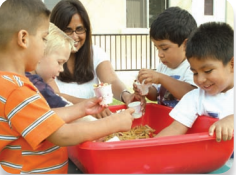9 2.2: The Role of Culture in Development
Although the early childhood field has a long history of commitment to developing culturally appropriate approaches to educating young children (“multicultural education”), it still struggles with understanding the role of culture in the development of our youngest children (Maschinot 2008; Derman-Sparks and Olsen Edwards 2010). To develop a culturally responsive approach, it is essential to understand that what children learn from families and teachers is an idea system that extends deep into the values of a group of people. Learning goes far beyond the things generally associated with culture, such as art, music, styles of dress, or holidays. As a child acquires cultural ways of being, these cultural rules for behavior impact identity by giving children the tools to understand their family/community and be understood in it.
Acquiring the idea system of the group is so powerful that it gives children the ability to interact with the group. For example, babies are born with the capability to make sounds; however, those sounds become meaningful only as they communicate with their families. Through communication the sounds are shaped and organized into the words and sentences the babies’ families use to share meaning. Thus, as children come to know the ideas that govern speech and language in their community, they gain the power to communicate and to represent themselves in the world.
So, when teachers treat culture with an almost exclusive emphasis on the celebrations, styles of dress, art, music, and food habits, they fail to appreciate the depth of cultural impact and the idea system at work in the process of development. Although a child’s identity is impacted by participation in family cultural rituals, the focus neither starts nor ends there. Surrounding children with artifacts and customs that are a part of their history, homes, and communities is important. However, when that approach becomes the sole emphasis in attempts to embrace culture, it diverts attention from the more fundamental role that culture plays in the development of children’s social, emotional, physical, and intellectual well-being. The challenge for teachers of young children is to understand the importance of culture to human development and to move beyond mere cultural appreciation and enrichment to cultural empowerment. [26]


